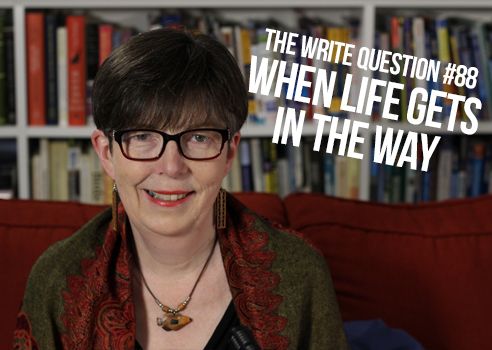Viewing time: 5 mins. 6 secs.
The Write Question is a weekly video podcast about writing that I started in 2017 and that ran, more or less weekly, until April 2022. This is a republication of issue #88, which addresses what to do when life gets in the way of writing. The post first ran on March 8/19.
Transcript:
Welcome to The Write Question, I’m Daphne Gray-Grant and my topic today is about life getting in the way of writing.
I have a question from Cristi Pintella, a grad student based in Portland, Oregon. Here’s what she’s asked:
“How do you keep making steady progress on a writing project when everything else in your life is hard? For me, writing is hard on its own and then it gets way harder when you pile everything else on top, working a full-time job, not getting enough sleep, managing anxiety or depression, maybe the dog gets sick…. My question is: How do you keep making steady progress when all of that is happening?”
Thanks for your question, Cristi. Life really does get in the way, sometimes, doesn’t it? We have lofty ideas, ambitious plans and incredible aspirations and then, we have a car accident or the dog gets sick.
If it’s any comfort, understand that everyone faces the same challenges. Unexpected illness. Financial problems. Disrupted sleep. Difficult bosses. These day-to-day hassles affect almost all of us at some point in our lives. Also, be aware that many writers start their careers while they’re doing other full-time jobs. So I’m not convinced that having a full-time job should be considered a barrier to writing.
The issue for you is that it’s affecting your writing. So the first thing to ask yourself is why?
I’m guessing it’s because you might struggle with what’s popularly called “writer’s block.” You CAN get around this issue, however, with some planning and diligence.
The best way to start is by making your writing goal very small. In fact, breathtakingly small. Five minutes is often enough and if that seems too daunting, then make it three. Even one minute is A-OK. Just do it five days a week. Of course, you’re allowed to have weekends off.
I know, I know. You’re going to tell me you can barely turn on your computer in that time. Fair enough. But the idea isn’t to write tons of words in a few minutes. It’s to create a habit.
What you want is a goal you can achieve, day after day. The power comes from the day-after-day part, not the five minutes. Don’t increase your time until you’ve hit the five-minute total for at least two weeks, and maybe even longer.
Then, when you’re ready to increase the five minutes, do so by only a small amount. Don’t go from five minutes to 20! Advance to 10 minutes. And do that for another two weeks.
Remember, you aren’t allowed to write longer than the time you’ve designated. The whole idea is to create what economists call “pent-up demand.” That way, writing will become something you anticipate with pleasure rather than something you regard with dread.
Yes, this process is slow to start. But we’re playing guerrilla warfare with writer’s block! And keep in mind that I’ve used this technique to help writers finish 80,000 word books and dissertations exceeding 100,000 words. This system works. It just takes time.
The value is that it allows you to create a sustainable writing habit. And you know how hard it is to break habits, right?
Let me give another couple of other suggestions as well: If the thought of writer’s block or feelings of anxiety about writing ever cross your mind, then you need to reduce your time commitment again. You want to protect your habit by ensuring you do it every day, at least five days a week.
Also, if you’re going away on holiday or taking a break, expect you will face a challenge in resuming your habit. Don’t allow this to surprise you. Instead, restart your habit with an easy amount of time. And if that needs to be no more than five minutes a day, so be it. Don’t judge yourself! You want to be able to finish your writing every day with no anxiety and no concern.
I know some writers might feel this plan is too easy — almost lackadaisical. But keep in mind that writing is a creative process and if you’re also dealing with anxiety, you need to take whatever steps necessary to protect your creative self and maintain your writing habit.
Finally, let me wrap up with a wonderful quote from the 18th century writer Samuel Johnson: “The chains of habit are generally too small to be felt until they are too strong to be broken.”
Thanks for the question, Cristi! I’d like to encourage anyone who’s facing anxiety to embrace some very small chains, and, over time, turn them into something strong and powerful and very difficult to break.


